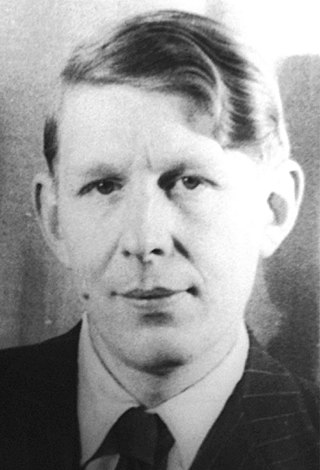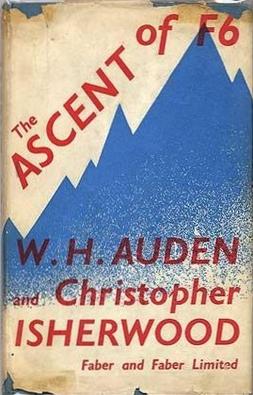
Wystan Hugh Auden was a British-American poet. Auden's poetry is noted for its stylistic and technical achievement, its engagement with politics, morals, love, and religion, and its variety in tone, form, and content. Some of his best known poems are about love, such as "Funeral Blues"; on political and social themes, such as "September 1, 1939" and "The Shield of Achilles"; on cultural and psychological themes, such as The Age of Anxiety; and on religious themes, such as "For the Time Being" and "Horae Canonicae".

Christopher William Bradshaw Isherwood was an Anglo-American novelist, playwright, screenwriter, autobiographer, and diarist. His best-known works include Goodbye to Berlin (1939), a semi-autobiographical novel which inspired the musical Cabaret (1966); A Single Man (1964), adapted as a film by Tom Ford in 2009; and Christopher and His Kind (1976), a memoir which "carried him into the heart of the Gay Liberation movement".
The Downs Malvern is a private prep school in the United Kingdom, founded in 1900. It is located on a 55-acre (22 ha) site in Colwall in the County of Herefordshire, on the western slopes of the Malvern Hills. The school takes children aged 2 to 13 and comprises a nursery, kindergarten, pre-prep, and preparatory school; the preparatory school takes both day students and boarders. The Headmaster since 2009 has been Alastair Cook, who is a member of the Boarding Schools Association and the IAPS. Fees are currently up to £21,471 pa for full boarders and up to £16,221 pa for day pupils.

"Musée des Beaux Arts" is a 23-line poem written by W. H. Auden in December 1938 while he was staying in Brussels, Belgium, with Christopher Isherwood. It was first published under the title "Palais des beaux arts" in the Spring 1939 issue of New Writing, a modernist magazine edited by John Lehmann. It next appeared in the collected volume of verse Another Time, which was followed four months later by the English edition. The poem's title derives from the Musées Royaux des Beaux-Arts de Belgique, the French-language name for the Royal Museums of Fine Arts of Belgium located in Brussels. The museum is famous for its collection of Early Netherlandish painting. When Auden visited the museum he would have seen a number of the paintings of the "Old Masters" referred to in the second line of the poem, including the Fall of Icarus which at the time was still regarded as an original by Pieter Bruegel the Elder.

Blanchland is a village in Northumberland, England, on the County Durham boundary. The population of the civil parish at the 2011 census was 135.

The Berlin Stories is a 1945 omnibus by Anglo-American writer Christopher Isherwood and consisting of the novels Mr Norris Changes Trains (1935) and Goodbye to Berlin (1939). The two novels are set in Jazz Age Berlin between 1930 and 1933 on the cusp of Adolf Hitler's ascent to power. Berlin is portrayed by Isherwood during this chaotic interwar period as a carnival of debauchery and despair inhabited by desperate people who are unaware of the national catastrophe that awaits them.
"Funeral Blues", or "Stop all the clocks", is a poem by W. H. Auden which first appeared in the 1936 play The Ascent of F6. Auden substantially rewrote the poem several years later as a cabaret song for the singer Hedli Anderson. Both versions were set to music by the composer Benjamin Britten. The second version was first published in 1938 and was titled "Funeral Blues" in Auden's 1940 Another Time. The poem experienced renewed popularity after being read in the film Four Weddings and a Funeral (1994), which also led to increased attention on Auden's other work. It has since been cited as one of the most popular modern poems in the United Kingdom.

Poems is the title of three separate collections of the early poetry of W. H. Auden. Auden refused to title his early work because he wanted the reader to confront the poetry itself. Consequently, his first book was called simply Poems when it was printed by his friend and fellow poet Stephen Spender in 1928; he used the same title for the very different book published by Faber and Faber in 1930, and by Random House in 1934, which also included The Orators and The Dance of Death.
The Auden Group or the Auden Generation is a group of British and Irish writers active in the 1930s that included W. H. Auden, Louis MacNeice, Cecil Day-Lewis, Stephen Spender, Christopher Isherwood, and sometimes Edward Upward and Rex Warner. They were sometimes called simply the Thirties poets.

The Ascent of F6: A Tragedy in Two Acts, by W. H. Auden and Christopher Isherwood, was the second and most successful play in the Auden-Isherwood collaboration, first published in 1936. It was a major contribution to English poetic drama in the 1930s. It has been seen as a parable about will, leadership and the nature of power: matters of increasing concern in Europe as that decade progressed.

The Dance of Death is a one-act play in verse and prose by W. H. Auden, published in 1933.
"The Sea and the Mirror: A Commentary on Shakespeare's The Tempest" is a long poem by W.H. Auden, written 1942–44, and first published in 1944. Auden regarded the work as “my Ars Poetica, in the same way I believe The Tempest to have been Shakespeare’s.”
Francis Adrian Joseph Turville-Petre was a British archaeologist, famous for the discovery of the Homo heidelbergensis fossil Galilee Man in 1926, and for his work at Mount Carmel, in what was then the British Mandate of Palestine, now Israel. He was a close friend of Christopher Isherwood and W. H. Auden.

Edward Oswald Gabriel Turville-Petre was an English philologist who specialized in Old Norse studies.

Sir Stephen Harold Spender was an English poet, novelist and essayist whose work concentrated on themes of social injustice and the class struggle. He was appointed U.S. Poet Laureate Consultant in Poetry to the Library of Congress in 1965.
This is a bibliography of books, plays, films, and libretti written, edited, or translated by the Anglo-American poet W. H. Auden (1907–1973). See the main entry for a list of biographical and critical studies and external links.
Joan Vincent Murray was a Canadian American poet.

The Lord Crewe Arms Hotel is a medieval hotel in Blanchland, Northumberland, England. It is dated to 1165 and was used as a hiding hole by monks of nearby Blanchland Abbey for centuries and contains hidden stairways and stone flagged floors. The hotel is built upon the former abbey guest house.
"The Platonic Blow, by Miss Oral" is an erotic poem by W. H. Auden. Thought to have been written in 1948, the poem gleefully describes in graphic detail a homosexual encounter involving an act of fellatio.
William Kozlenko was a playwright, screenwriter, and editor of multiple stage-play compilations and anthologies, as well as being a founding editor of One-Act Play Magazine, which published from 1937–1942, and a co-founder of the One-Act Repertory Theater. His best-known editorial compilations include The Disputed Works of William Shakespeare and the 1938 collection The Best Short Plays of the Social Theater, which included contemporary works such as Clifford Odets' Waiting for Lefty, Marc Blitzstein's The Cradle Will Rock, and W.H. Auden's and Christopher Isherwood's The Dog Beneath the Skin.











